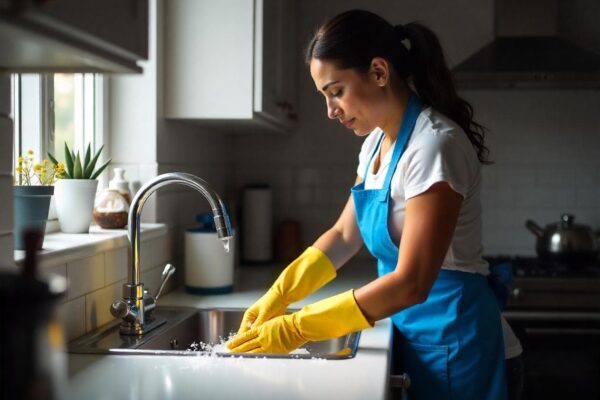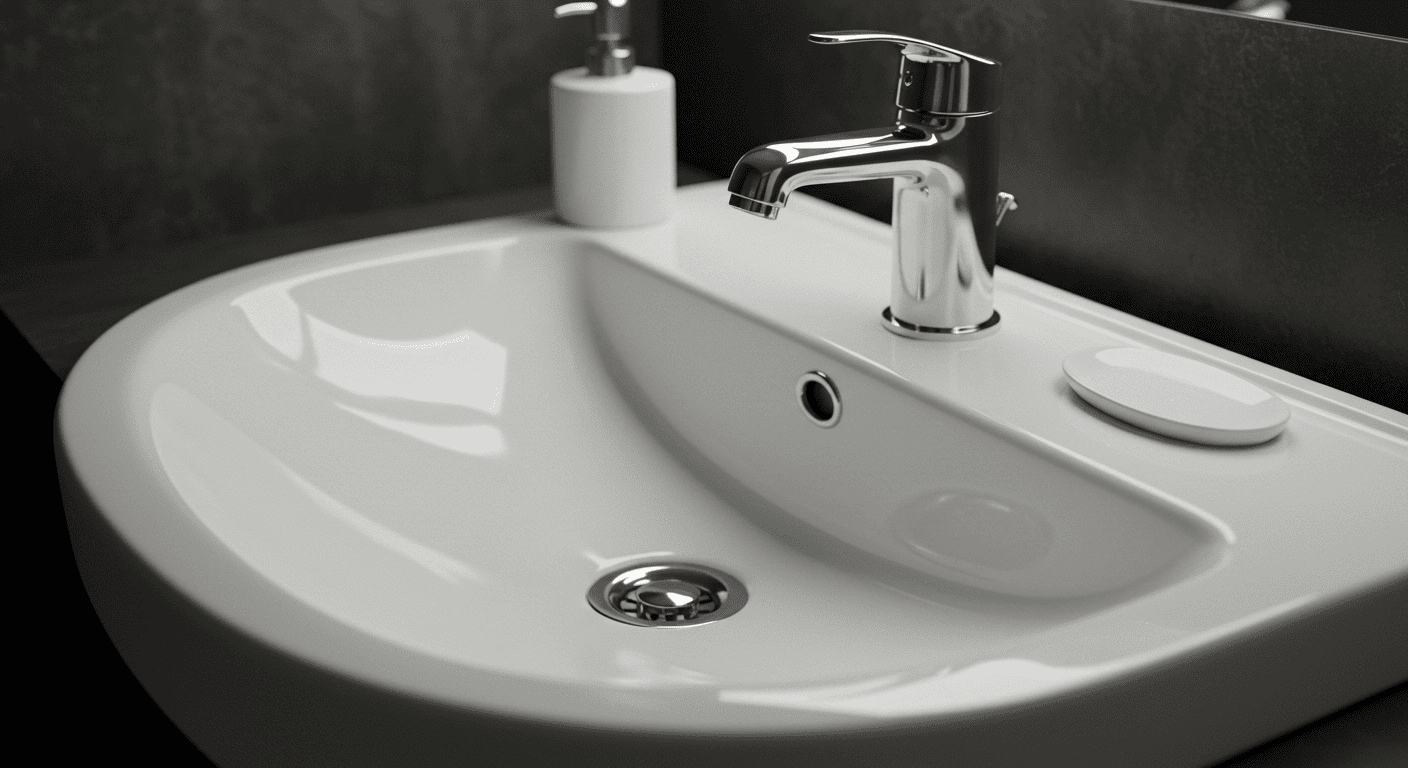How to clean bathroom sink naturally is a question many homeowners ask when looking for safer, eco-friendly ways to keep their bathrooms spotless. Using natural cleaning products for bathroom sinks not only protects your health by avoiding harsh chemicals but also helps the environment by reducing toxins released down the drain. In this post, you’ll discover simple DIY cleaning hacks that use common ingredients like baking soda, white vinegar, and lemon juice to effectively clean, deodorize, and maintain your bathroom sink. Say goodbye to stubborn stains and soap scum with these easy, affordable, and eco-friendly bathroom cleaning tips that anyone can try!
Why Choose Natural Cleaning for Your Bathroom Sink?
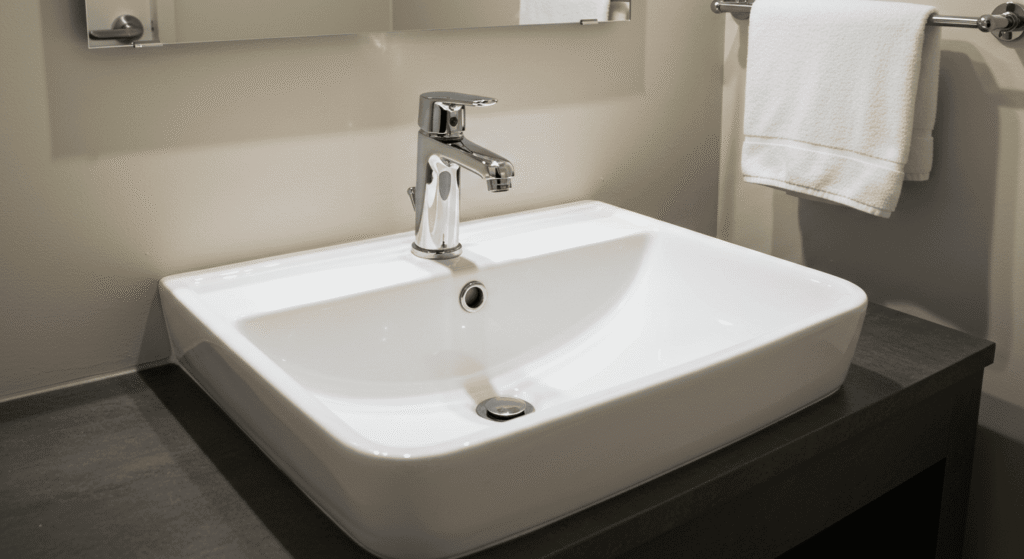
Choosing natural cleaning products for bathroom sinks is more than just a trend—it’s a conscious decision that benefits your health, the environment, and your wallet. Many commercial bathroom cleaners contain harsh chemicals that can cause irritation and leave harmful residues. By switching to natural methods, you not only protect yourself but also make a positive impact on the planet. Below, we explore the key reasons why natural cleaning is the smarter choice for your bathroom sink.
Health Benefits of Non-Toxic Cleaners
Using non-toxic bathroom sink cleaner options means avoiding harsh chemicals and allergens commonly found in traditional cleaning products. These substances can trigger respiratory issues, skin irritations, or allergic reactions—especially for children, pets, and sensitive individuals. Natural ingredients like baking soda and white vinegar offer gentle yet effective cleaning without exposing your family to unnecessary risks.
Moreover, protecting your family’s well-being becomes easier when you eliminate synthetic fragrances and toxic additives. Natural cleaners break down quickly and don’t linger in the air or on surfaces, making your bathroom a safer, fresher place for everyone.
Environmental Impact of Natural Cleaning
When you use eco-friendly bathroom cleaning tips and natural ingredients, you help reduce water pollution. Conventional chemical cleaners often contain substances that harm aquatic life once they enter waterways. By choosing biodegradable and plant-based alternatives, you prevent these toxins from contaminating the environment.
Making sustainable choices for everyday life can start with something as simple as how you clean your sink. Natural cleaning methods reduce plastic waste (since many DIY recipes can be made at home in reusable containers) and promote a healthier planet. This small habit contributes to larger environmental benefits when adopted widely.
Cost-Effectiveness of DIY Cleaners
One of the best parts about natural cleaning is its affordability. Instead of purchasing expensive commercial products, you can use common kitchen ingredients instead of expensive cleaners to achieve excellent results. Items like lemon juice, baking soda, and vinegar are inexpensive, readily available, and multipurpose.
Creating your own homemade bathroom sink cleaner not only saves money but also reduces the clutter of multiple specialized products. This simplicity makes it easy to maintain a regular cleaning routine without breaking the bank or compromising on effectiveness.
Essential Natural Ingredients for Cleaning Your Bathroom Sink
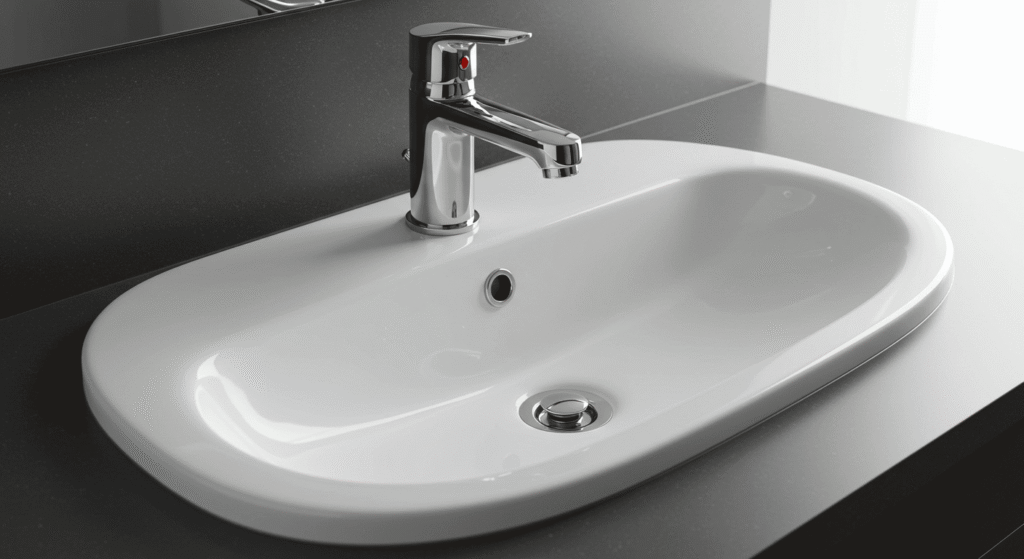
Knowing which natural ingredients to use is the key to mastering how to clean bathroom sink naturally. Some simple household staples offer powerful cleaning, deodorizing, and disinfecting benefits without harsh chemicals. Let’s explore the essential ingredients that form the foundation of effective, eco-friendly bathroom sink cleaning.
The Power Trio: Baking Soda, White Vinegar, and Lemon Juice
These three ingredients are the cornerstone of many DIY bathroom sink cleaning hacks because of their unique and complementary properties.
- Baking soda acts as a gentle abrasive that scrubs away grime and neutralizes odors, making it perfect for deodorizing your sink and removing stubborn residues.
- White vinegar is acidic, which helps dissolve mineral deposits like hard water stains and soap scum while also providing natural disinfectant properties.
- Lemon juice offers natural bleaching and stain-fighting effects, leaving your sink with a fresh, shiny finish and a subtle citrus scent.
When combining these ingredients, it’s important to do so safely to maximize their effectiveness. For example, use baking soda as a paste with lemon juice for scrubbing, or spray vinegar separately to avoid neutralizing their cleaning powers. Avoid mixing vinegar and baking soda in closed containers since they react and produce gas.
Bonus Helpers: Essential Oils and Castile Soap
To boost the natural cleaning power and scent of your homemade cleaners, you can add essential oils and castile soap.
- Essential oils such as tea tree, lavender, or eucalyptus provide natural antimicrobial effects and a pleasant fragrance that freshens the bathroom without synthetic chemicals.
- Castile soap is a gentle, plant-based soap that helps break down dirt and grease while being safe for most surfaces.
To use essential oils effectively, add a few drops to your vinegar spray or baking soda paste. This enhances the disinfecting properties and leaves behind a subtle, natural aroma.
Quick Reference Table: Natural Ingredients and Their Cleaning Benefits
| Ingredient | Purpose | How to Use | Safety Tips |
|---|---|---|---|
| Baking Soda | Scrubbing, deodorizing | Sprinkle and scrub gently | Avoid inhaling powder |
| White Vinegar | Dissolving mineral deposits | Spray or soak with vinegar | Avoid mixing with bleach |
| Lemon Juice | Stain removal, shine | Apply directly or mix with baking soda | Test on surfaces first |
| Essential Oils | Disinfectant, scent | Add a few drops to mixtures | Use diluted |
This table offers a quick glance at the natural ingredients that can transform your bathroom sink cleaning routine into an effective, safe, and environmentally friendly practice.
Step-by-Step Natural Cleaning Routine for Your Bathroom Sink
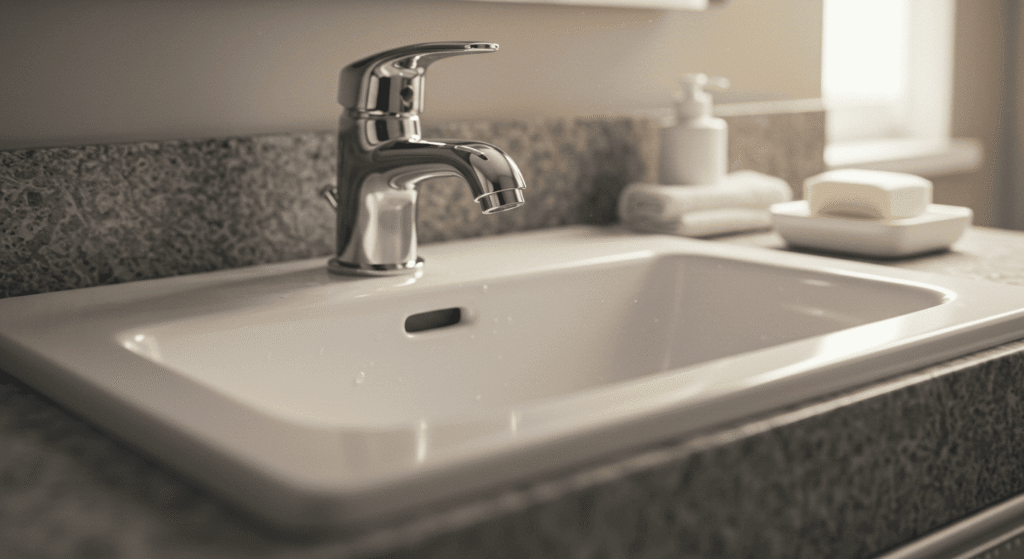
Maintaining a clean and fresh bathroom sink doesn’t have to be complicated or rely on harsh chemicals. With a simple, natural cleaning routine for bathroom sink, you can keep your space spotless, hygienic, and inviting every day. Breaking it down into daily, weekly, and monthly steps helps make cleaning manageable and effective.
Daily Quick Clean: Keep It Fresh and Sparkling
For everyday freshness, a quick wipe-down is all you need. Use a small amount of castile soap, diluted in warm water, and a soft microfiber cloth to clean your sink surface. This gentle routine removes light dirt, toothpaste residue, and water spots before they build up.
To prevent stubborn soap scum and mineral deposits, dry your sink with a clean towel after each use. This simple habit helps reduce moisture that encourages grime formation and keeps your sink looking shiny.
Weekly Deep Clean: Tackling Soap Scum and Mineral Deposits
Once a week, give your sink a deeper clean to tackle soap scum and mineral buildup. Make a paste by mixing baking soda with a little water, then apply it to the sink basin and faucet areas. Spray white vinegar over the paste, causing a natural fizzing reaction that lifts dirt and dissolves deposits.
Let the mixture sit for about 10 to 15 minutes to maximize cleaning power, then gently scrub with a non-abrasive sponge or brush. Rinse thoroughly with warm water and dry with a microfiber cloth for a polished finish.
Monthly Maintenance: Preventing Drain Clogs Naturally
Monthly care helps prevent clogged drains using natural methods that are safe for your plumbing. Pour half a cup of baking soda down the drain, followed by half a cup of white vinegar. Allow the mixture to bubble and work for 15 to 20 minutes before flushing the drain with hot water.
During this time, use a soft toothbrush or small scrub brush to gently clean around the faucet base and sink edges where dirt and grime tend to accumulate. This monthly maintenance keeps your bathroom sink functioning smoothly and looking fresh.
DIY Cleaning Hacks: Creative and Effective Recipes
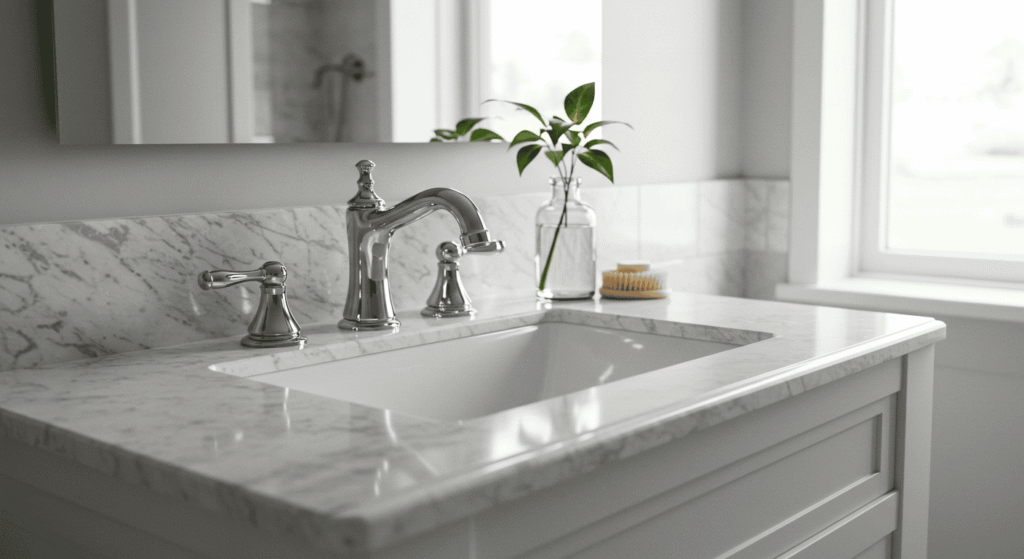
Natural cleaning doesn’t have to be boring or complicated. With a few simple ingredients, you can whip up powerful, eco-friendly solutions that tackle tough stains, keep your sink fresh, and deodorize drains—all without relying on chemicals. Here are some of the best DIY cleaning hacks to make your bathroom sink sparkle naturally.
Natural Scrubbing Paste for Tough Stains
For stubborn stains and grime buildup, try this easy-to-make scrubbing paste using baking soda, lemon juice, and a few drops of your favorite essential oils. Baking soda provides gentle abrasion, lemon juice acts as a natural bleach and stain remover, while essential oils add antimicrobial properties and a fresh scent.
To apply, spread the paste on the stained areas of your sink and let it sit for 10 minutes. Then, using a soft sponge or cloth, scrub gently in circular motions to avoid scratching delicate surfaces. Rinse thoroughly with warm water and wipe dry for a gleaming finish.
Spray Cleaner for Daily Use
Keep your sink fresh every day with a simple, natural spray cleaner made from white vinegar, water, and essential oils. Mix equal parts vinegar and water in a spray bottle, then add 10–15 drops of essential oils like tea tree or eucalyptus for an added antimicrobial boost.
Shake well before each use and spray liberally over sink surfaces, wiping down with a microfiber cloth. Store your homemade spray in a cool, dark place to preserve the oils’ effectiveness, and make a fresh batch every couple of weeks for best results.
Deodorizing Sink Drain Trick
A smelly sink drain can be unpleasant, but you can naturally deodorize it with baking soda and citrus peels from lemons or oranges. Simply sprinkle half a cup of baking soda down the drain, followed by a handful of chopped citrus peels.
The baking soda neutralizes odors while the citrus oils break down grease and leave a refreshing scent. Let the mixture sit for 15 minutes, then flush with hot water. Repeat this trick once a month or whenever you notice unpleasant smells.
How to Remove Common Bathroom Sink Stains Naturally
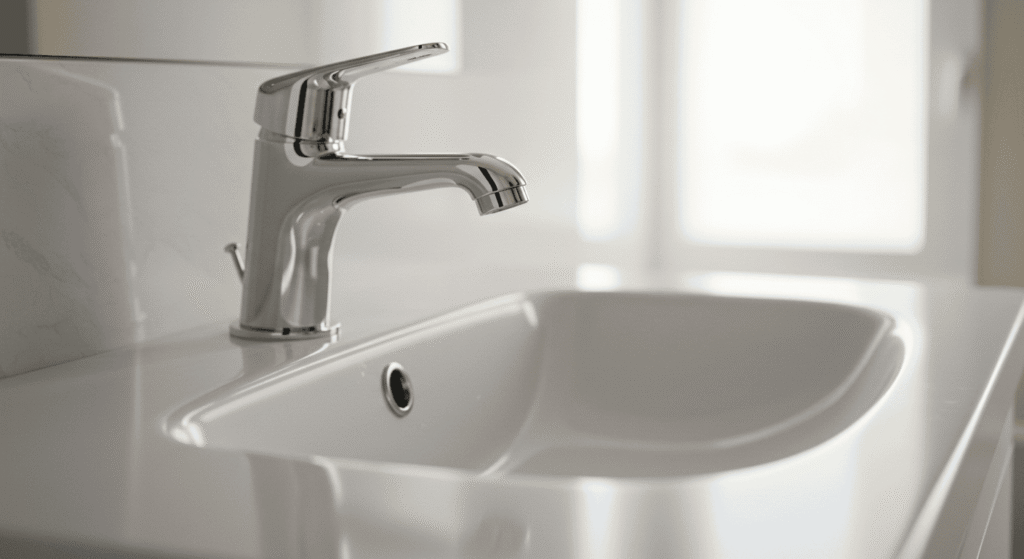
Bathroom sinks often accumulate stubborn stains that can dull their appearance and make cleaning a chore. Fortunately, you can tackle many of these issues using simple, natural cleaning products for bathroom sinks. Here’s how to remove common stains effectively while keeping your routine eco-friendly.
Soap Scum Removal
Soap scum builds up from minerals in water mixing with soap residues, leaving a filmy layer that’s hard to wipe away. To remove it naturally, sprinkle baking soda generously over the affected areas. Then spray white vinegar on top, letting the mixture fizz and break down the residue.
Allow it to sit for 10 to 15 minutes before scrubbing gently with a soft brush or sponge. Rinse well with warm water and dry with a clean cloth. To prevent soap scum buildup, wipe your sink dry after each use and avoid letting water sit in the basin.
Hard Water Stains and Mineral Build-up
Hard water stains often leave dull, chalky deposits around faucets and sink surfaces. To dissolve these mineral deposits, soak a cloth in lemon juice and place it over the stained area for 15 to 20 minutes. The natural acidity of lemon helps break down the minerals while brightening the surface.
For tough or recurring stains, repeat this process weekly until the build-up clears. After treatment, rinse the sink thoroughly and buff with a dry cloth for extra shine.
Rust Stains and Discoloration
Rust stains and discoloration can be stubborn but can often be treated with a homemade natural scrubbing paste using baking soda and lemon juice. Apply the paste over rust spots, let it sit for 20 minutes, then scrub gently. This combination helps break down iron deposits without damaging your sink.
However, if rust stains persist or worsen, it might indicate underlying plumbing issues. In such cases, it’s wise to seek a professional follow-up to prevent further damage.
Maintaining a Germ-Free Sink Without Chemicals
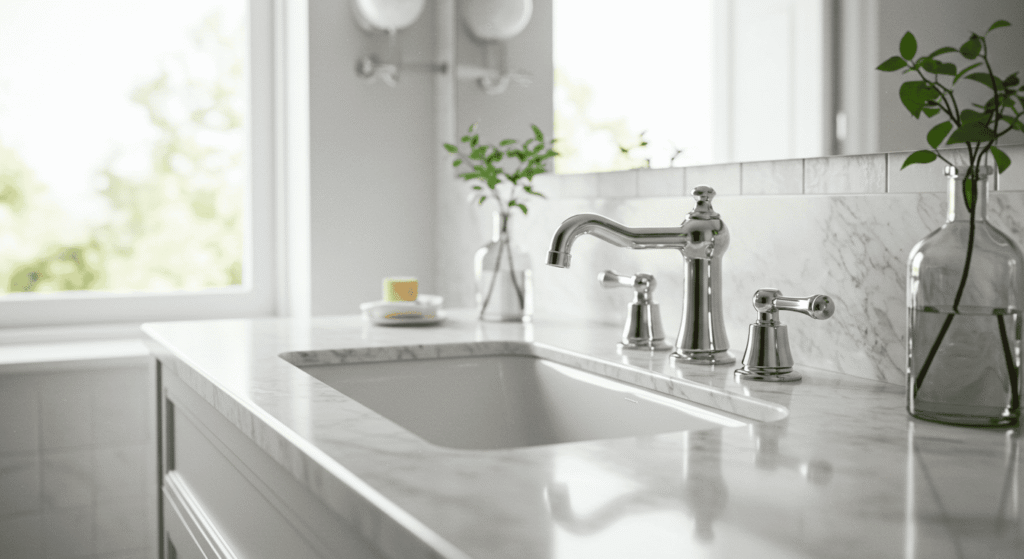
Keeping your bathroom sink hygienic and fresh doesn’t require harsh chemical disinfectants. With the right natural disinfectants and smart habits, you can maintain a clean, germ-free sink that’s safe for your family and the environment.
Natural Disinfectants You Can Trust
Certain essential oils possess powerful antimicrobial properties that make them excellent natural disinfectants. Oils like tea tree, eucalyptus, and lavender can help reduce bacteria and freshen your bathroom sink without toxic residues.
To incorporate them safely, add a few drops to your homemade cleaning sprays or scrubbing pastes. Always dilute essential oils with water or a carrier like castile soap to avoid skin irritation and ensure safe use around children and pets.
Proper Drying and Ventilation to Prevent Mold
Moisture is a prime factor in mold growth around your sink area. After cleaning, always dry the sink basin and faucet with a soft towel to remove lingering dampness. Keep bathroom windows open when possible, or use an exhaust fan to promote good air circulation.
These simple practices prevent mold and mildew buildup, keeping your bathroom sink area fresh and healthy.
DIY Freshening Sachets for Sink Area
For an added touch of freshness, create DIY sachets using dried herbs such as rosemary, lavender, or mint combined with a few drops of your favorite essential oils. Place these sachets near your sink or under the basin to naturally deodorize the area.
To maximize freshness, replace the sachets every 4 to 6 weeks and refresh with a few drops of essential oil as needed. These little aromatic boosters help maintain a pleasant scent without artificial fragrances.
Tips to Prevent Soap Scum and Mineral Deposits Naturally
Prevention is always better than cure, especially when it comes to keeping your bathroom sink free from stubborn soap scum and mineral deposits. With a few smart natural cleaning tips for bathroom sinks and daily habits, you can reduce buildup and enjoy a cleaner sink for longer.
Water Softening Tips at Home
Hard water is a major culprit behind mineral deposits and soap scum. While professional water softeners are an option, there are simple home hacks to reduce mineral buildup naturally. Installing a water filter on your faucet can help minimize calcium and magnesium that cause hardness. Alternatively, regularly wiping your sink dry and using lemon juice or vinegar during cleaning helps break down minerals before they accumulate.
Daily Habits That Keep Your Sink Cleaner Longer
Small daily habits make a big difference. After each use, wipe your sink with a cloth dipped in diluted castile soap to remove soap residues and water spots. Avoid harsh scrubbing or abrasive tools that can damage your sink’s surface and make it more prone to stains.
Consistently drying the sink prevents moisture buildup, which reduces the chances of mineral deposits and mold forming.
Quick-Reference Checklist: Daily, Weekly, Monthly Sink Care
| Frequency | Task | Natural Product Used | Notes |
|---|---|---|---|
| Daily | Wipe down with castile soap | Castile soap, microfiber cloth | Prevents buildup |
| Weekly | Deep clean with baking soda paste | Baking soda, vinegar | Removes soap scum, mineral deposits |
| Monthly | Natural drain cleaning | Baking soda, vinegar | Prevents clogs |
Use this checklist to stay on top of your bathroom sink cleaning routine naturally — simple actions spread out over time keep your sink spotless and hygienic.
Frequently Asked Questions About Natural Bathroom Sink Cleaning
When switching to natural bathroom sink cleaning, it’s normal to have questions about effectiveness, safety, and routine. Here are some answers to common queries to help you clean confidently and naturally.
Can I use vinegar on all types of bathroom sinks?
While vinegar is a versatile natural cleaner, it’s important to know your sink’s material before using it. Vinegar’s acidity can damage delicate surfaces like natural stone (marble, granite) or certain finishes. For these, opt for milder options like baking soda or diluted castile soap instead.
For ceramic, porcelain, stainless steel, and most other common sink materials, vinegar is safe when used diluted and rinsed promptly.
How often should I clean my sink naturally?
A good natural cleaning routine for bathroom sinks includes daily wiping with a gentle cleanser like castile soap, weekly deep cleaning with baking soda and vinegar, and monthly maintenance for drains and buildup.
Adjust frequency based on your sink’s usage and water hardness—more frequent cleaning may be needed in homes with hard water or heavy usage.
Are natural cleaners as effective as commercial ones?
Natural cleaners can be just as effective as commercial products when used correctly, especially for regular maintenance and common stains like soap scum and mineral deposits. However, some extreme buildup or tough stains may require more time or repeated treatments.
For best results, combine natural ingredients wisely (like baking soda and vinegar) and practice prevention through consistent care. Natural cleaning is safer for your health and the environment without sacrificing cleanliness.
How to Clean Bathroom Sink Naturally: Final Thoughts for a Sparkling, Eco-Friendly Routine
Learning how to clean bathroom sink naturally not only keeps your space sparkling but also protects your health and the environment. By using simple, safe ingredients like baking soda, vinegar, and lemon juice, combined with easy daily habits, you can maintain a fresh, germ-free sink without harsh chemicals. Embrace these natural cleaning hacks and enjoy a cleaner bathroom that’s gentle on your surfaces and your family. Start your eco-friendly cleaning journey today for a healthier home!






